|
|
|
Sort Order |
|
|
|
Items / Page
|
|
|
|
|
|
|
| Srl | Item |
| 1 |
ID:
133456
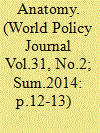

|
|
|
|
|
| Publication |
2014.
|
| Summary/Abstract |
Alternative currency is a privately developed form of money that is used as a substitute to national currency in designated areas. It is not regulated by national governments or banks. A familiar example is the e-currency, Bitcoin. However, Bitcoin is neither the only nor the oldest example of alternative money. The chiemgauer, Brixton pound, sardex, and the dam are examples of alternative money currently in use in Germany, England, Italy, and the Netherlands, respectively. The goal with these currencies is to promote the idea of spending locally. By keeping the currency within the designated area, the local economy is able to prosper regardless of the state of the national economy. This enables communities to establish local markets that are less affected by national trends
|
|
|
|
|
|
|
|
|
|
|
|
|
|
|
|
| 2 |
ID:
110964
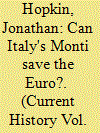

|
|
|
|
|
| Publication |
2012.
|
| Summary/Abstract |
Italy may reluctantly accept being 'saved by Europe' once again. But…[if] the country turns back to populism, there will be dramatic consequences for the governance of the European economy.
|
|
|
|
|
|
|
|
|
|
|
|
|
|
|
|
| 3 |
ID:
131054
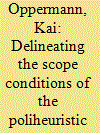

|
|
|
|
|
| Publication |
2014.
|
| Summary/Abstract |
The poliheuristic theory of foreign policy decision making would benefit from being clearer in spelling out the conditions under which it holds more or less analytic promise. The article makes the case that the concept of issue salience can help the theory address its shortcomings in this respect. In particular, the explanatory power of poliheuristic theory's two-stage model largely depends on the noncompensatory principle of major domestic political loss avoidance on the first stage of the model to simplify the choice set to be considered on the second stage. This is more likely to happen, however, in the case of issues that are highly salient to a government's selectorate than in the case of issues that are of low salience in the domestic arena. The poliheuristic theory should thus be more powerful if it is applied to domestic high-salience rather than low-salience decisions. These theoretical contentions are illustrated in a case study on the decision making of the British Labour government under Tony Blair in the fields of European security and defense policy and the single European currency.
|
|
|
|
|
|
|
|
|
|
|
|
|
|
|
|
| 4 |
ID:
133002
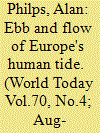

|
|
|
|
|
| Publication |
2014.
|
| Summary/Abstract |
For each country the orange area and the figure in light type represent the percentage of migrants in the population in 1990. The red area, with the bold figure, shows the proportion in 2013. In these UN figures, migrants are defined as those born outside their country of residence, including refugees
|
|
|
|
|
|
|
|
|
|
|
|
|
|
|
|
| 5 |
ID:
128842
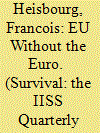

|
|
|
|
|
| Publication |
2014.
|
| Summary/Abstract |
The single currency was supposed to have led to greater political union, but the policies taken to ensure its survival are having the opposite effect. An orderly retreat from the euro might be the EU's least-bad option. As the euro area enters its seventh year of economic stagnation, the future of the European integration process remains in suspense. In the medium-to-long term, highly divergent scenarios remain possible, with variable degrees of likelihood, from full-blown federalisation at one extreme to the catastrophic collapse of the euro and of the European Union at the other. Somewhere in between comes the actual set of policies currently followed, sometimes described as 'muddling through', more aptly called 'muddling down' in terms of its effects on growth and mass unemployment. Since the middle of 2012, the mix of recessive policies of 'internal devaluation', limited pooling of eurozone liabilities and decisive intervention by the European Central Bank (ECB) have deferred for an undetermined period of time the risk of a disorderly break-up of the euro. The strategic consequences of this range of potential and actual policy paths have been discussed in previous issues of Survival.
|
|
|
|
|
|
|
|
|
|
|
|
|
|
|
|
| 6 |
ID:
128841


|
|
|
|
|
| Publication |
2014.
|
| Summary/Abstract |
Germany's highest court stopped short of ruling the European Central Bank's programme to support the euro illegal. Now the European Court of Justice must find a way to make the programme acceptable without making it ineffective.
|
|
|
|
|
|
|
|
|
|
|
|
|
|
|
|
| 7 |
ID:
129536
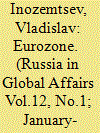

|
|
|
|
|
| Publication |
2014.
|
| Summary/Abstract |
The euro is a young currency that has all chances to make Europe a global player if the problems associated with its "premature birth" are solved in a decisive manner. The fiscal authorities should resort to extraordinary measures in order to accelerate economic growth, reduce unemployment, and boost the continent's competitiveness. For years the economic situation in Europe has been a matter of deep concern to politicians and economists. The European Union remains the largest economic power in the world, accounting for more than 20% of global gross product, possessing a huge export potential generating up to 16.4% of international trade with 161 of the world's top 500 companies, and with ample technological and financial resources. However, the EU economy is growing way too slow and its problems are becoming increasingly noticeable. The reason for this has been mentioned many times: poorly regulated public finance in the eurozone countries, which became particularly obvious during the global crisis of 2008-2009.
|
|
|
|
|
|
|
|
|
|
|
|
|
|
|
|
| 8 |
ID:
128321
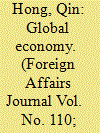

|
|
|
|
|
| Publication |
2013.
|
| Summary/Abstract |
The year 2013 continues to witness profound and complex changes in the international economic landscape. The underlying impact of the international financial crisis remains, and the recovery of the global economy is unstable, unsustainable and uneven. China has maintained steady economic growth through vigorous reform, and actively participated in global economic governance, making important contribution to global growth.
|
|
|
|
|
|
|
|
|
|
|
|
|
|
|
|
| 9 |
ID:
129440
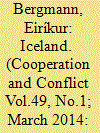

|
|
|
|
|
| Publication |
2014.
|
| Summary/Abstract |
The historical links with imperial Denmark still have an impact on Iceland's foreign policy and its approach to Europe in particular. This article examines the triangular relationship between Iceland, its former colonizers (Norway and Denmark) and the European Union (EU). Iceland's political identity was carved out in the course of its independence struggle from Denmark (1830-1944), based on a fundamental belief in its formal sovereignty, which still dictates Icelandic foreign relations to a great extent. In order to uphold the standard of being considered a modern Nordic welfare state, however, Iceland has an economic need to participate in the EU's internal market, resulting in the European Economic Area agreement. Iceland's postimperial sovereignty games are mostly played within these boundaries. To understand its position within the European project, this paper analyses how, until the economic 'Crash of 2008', the national identity emerging out of the colonial experience has limited Iceland's relationship with the EU.
|
|
|
|
|
|
|
|
|
|
|
|
|
|
|
|
| 10 |
ID:
121581
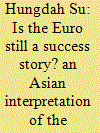

|
|
|
|
|
| Publication |
2013.
|
| Summary/Abstract |
Since outbreak of the sovereign debt crisis in several member states of the Eurozone in 2010, the Euro as a success story was suddenly thrown into doubt. In Asia, more and more scholars and policy analysts, a majority of whom had not focused their study on the EU or Euro before the crisis, have criticized the monetary integration in the Eurozone, put into doubt the value of European integration as a whole, and reiterate their pessimistic theses about the future of the European economy. This article represents a rebuttal to this criticism, arguing that the common currency is truly in difficulty but not in an impasse. A return to a success story of the Euro is still probable, if European leaders and their citizens could reestablish a balancing model between the financial discipline and economic growth in the EU, to which a general and in-depth debate over the future of European integration is indispensable.
|
|
|
|
|
|
|
|
|
|
|
|
|
|
|
|
| 11 |
ID:
133001
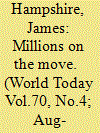

|
|
|
|
|
| Publication |
2014.
|
| Summary/Abstract |
Europe has emerged as one of the world's two major destination regions for immigrants since the 1990s. Today, there are 49.9 million international migrants in the European Economic Area, just slightly less than 50 million in North America. Europe is clearly a continent on the move, but it is equally clear that many Europeans are ill at ease with this.
|
|
|
|
|
|
|
|
|
|
|
|
|
|
|
|
| 12 |
ID:
129531
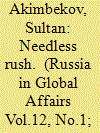

|
|
|
|
|
| Publication |
2014.
|
| Summary/Abstract |
Bilateral relations have always been of tremendous significance to Kazakhstan and Russia, and they always will be. In a sense, they are more important than a multi-party integration. Our relations had existed before the establishment of the Customs Union and will continue.
By the end of 2013, the key participants in the Customs Union of Russia, Belarus and Kazakhstan had largely clarified their positions. The meeting of the Supreme Economic Council held in December 2013 in Moscow had an important significance as it set the limits of possible integration, specifically with regard to endorsing roadmaps for Armenia and Kyrgyzstan. The very fact of adoption of this approach implied that the plan for the Union's rapid expansion was already on the formalization track, and that the potential members need time to complete membership procedures. This makes the Customs Union similar to the European Union whose establishment envisioned approximation of the member-states' economic parameters. It also means that a politically motivated rapid expansion is not possible.
|
|
|
|
|
|
|
|
|
|
|
|
|
|
|
|
| 13 |
ID:
030451
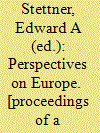

|
|
|
|
|
| Publication |
Cambridge, Schenkman Publishing company Inc., 1970.
|
| Description |
xii,191pPbk
|
| Standard Number |
0-87073-262-5
|
|
|
|
|
|
|
|
|
|
|
|
Copies: C:1/I:0,R:0,Q:0
Circulation
| Accession# | Call# | Current Location | Status | Policy | Location |
| 007210 | 940.557/STE 007210 | Main | On Shelf | General | |
|
|
|
|
| 14 |
ID:
128992
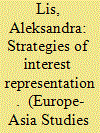

|
|
|
|
|
| Publication |
2014.
|
| Summary/Abstract |
Poland's European Union accession afforded Polish trade unions membership of European-wide, umbrella trade union organisations. This essay evaluates the strategies Polish trade unions adopted to represent their interests following Poland's accession to the European Union. It draws on a series of interviews and document analysis. In addition the essay seeks to gauge the extent to which Polish trade unions were 'Europeanised', understood in both the context of their adoption of European policy models and their ability to win support for their causes at the European level.
|
|
|
|
|
|
|
|
|
|
|
|
|
|
|
|
| 15 |
ID:
129211
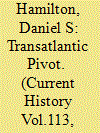

|
|
|
|
|
| Publication |
2014.
|
| Summary/Abstract |
A quarter century after the fall of the Berlin Wall, relations between the United States and Europe have evolved from a single-minded focus on stabilizing the European continent into more diffuse security, economic, and diplomatic agendas encompassing three broad elements. The first is ensuring the continued
vitality of the transatlantic alliance while taming the turbulent spaces of wider Europe. The second is guaranteeing mutual economic recovery while harnessing deep integration to create jobs and fuel growth, and also repositioning Europe and the United States for a world of emerging economies. The third is addressing a range of regional and global challenges, from energy security and nonproliferation to Middle Eastern turmoil and uncertain Asian dynamics.
|
|
|
|
|
|
|
|
|
|
|
|
|
|
|
|
| 16 |
ID:
123324
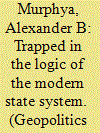

|
|
|
|
|
| Publication |
2013.
|
| Summary/Abstract |
In the wake of the Single European Act of the mid-1980s and a series of follow-on initiatives aimed at fostering greater integration in Europe, a number of commentators began describing Europe as a truly novel political-territorial arrangement. By the middle of the 1990s, however, the adoption of a common currency came to dominate the European integration agenda. The embrace of monetary union reflected a view of European integration that was firmly embedded in the logic of the modern territorial state system. That logic led many commentators to view the success or failure of integration in terms of the degree to which powers were being transferred from state governmental and economic institutions to the central decision-making bodies of the European Union. Such an approach cast the EU as a super-state rather than as a new type of political-institutional entity. As a result, the integration project was less subversive of the state system than it might otherwise have been - bolstering the view of the European Union as a distant bureaucracy not adequately attuned to the needs of everyday Europeans and fueling nationalist sentiments: a social force with deep roots in the modernist territorial order. Moving the European integration process forward will likely require embracing conceptions of progress that are less tethered to modernist territorial ideas and assumptions.
|
|
|
|
|
|
|
|
|
|
|
|
|
|
|
|
| 17 |
ID:
116602
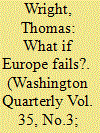

|
|
|
|
|
| Publication |
2012.
|
| Summary/Abstract |
The European Union is engaged in a ferocious political, diplomatic, and economic struggle to preserve the future of the single currency, the Euro, and the viability of what has become known simply as "the project," namely the process of integration that has been the bedrock of Western European politics for over half a century. It is distinctly possible that its members' efforts may fail, either in the short or long term, and give way to an era of disintegration. Some have sounded the alarm: German Chancellor Angela Merkel famously remarked, "If the Euro fails, Europe fails."1 Former president Nicolas Sarkozy of France predicted, "If the euro explodes, Europe would explode. It's the guarantee of peace in a continent where there were terrible wars."2 Polish Foreign Minister Radek Sikorski warned the Euro's collapse could cause an "apocalyptic" crisis.3 Harvard economist Dani Rodrik cautioned "the nightmare scenario would … be a 1930's-style victory for political extremism." After all, "fascism, Nazism, and communism were children of a backlash against globalization."4 The erosion of democracy in Hungary and the rise in support for populist parties in Greece, the Netherlands, Finland, and France appears to some to be the beginning of the end.
|
|
|
|
|
|
|
|
|
|
|
|
|
|
|
|
|
|
|
|
|